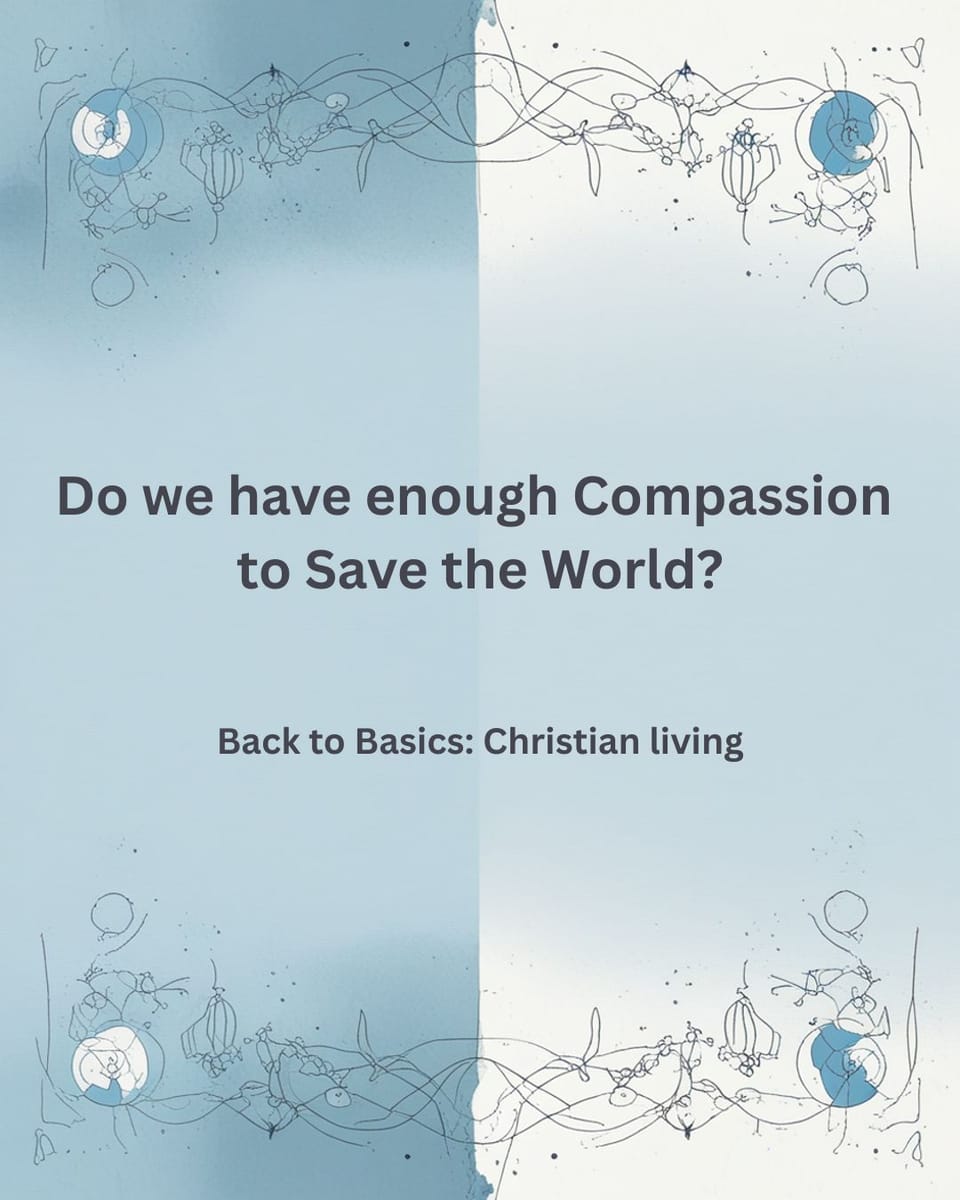Do we have enough Compassion to Save the World?

Biblical Compassion: Can Christians Really Change the World?
Do we have enough compassion to save the world? In today's rapidly changing society, where self-interest often takes precedence over the needs of others, this question becomes increasingly relevant. As Christians, we are called to embody Christ's compassion, to extend His love to a broken world. But do we truly understand what biblical compassion entails? And more importantly, are we living it out in ways that can bring about real transformation?
When we examine Scripture, we find that compassion is not merely a fleeting emotion or a momentary feeling of sympathy. Rather, it is a deep-seated virtue that moves us to action. The word "compassion" in the Bible often translates from terms that literally mean "to be moved in one's bowels" – suggesting that true compassion affects us at our very core.
Jesus exemplified this profound compassion throughout His ministry. In Matthew 9:36 (KJV) we read: "But when he saw the multitudes, he was moved with compassion on them, because they fainted, and were scattered abroad, as sheep having no shepherd". His compassion wasn't abstract or distant; it was visceral and immediate, compelling Him to heal the sick, feed the hungry, and ultimately sacrifice His life for our salvation.
The parable of the Good Samaritan (Luke 10:30-37) further illustrates what godly compassion looks like in action. While religious leaders passed by the wounded man, the Samaritan—from a despised group—stopped, tended to the man's wounds, and ensured his continued care. Jesus concludes this parable with the simple yet profound instruction: "Go and do thou likewise" Luke 10:37 (KJV).
But what does this mean for us today? In a world beset by poverty, conflict, environmental degradation, and spiritual emptiness, how can our compassion make a meaningful difference?
Firstly, biblical compassion must be grounded in truth. In Ephesians 4:15 (KJV), Paul speaks of "speaking the truth in love". Genuine compassion doesn't shy away from difficult truths but addresses them with gentleness and respect. We must avoid both harsh condemnation without love and affirmation without truth. Neither approach truly serves those we aim to help.
Secondly, our compassion must be practical. The apostle James challenges us: "If a brother or sister be naked, and destitute of daily food, and one of you say unto them, depart in peace, be ye warmed and filled; notwithstanding ye give them not those things which are needful to the body; what doth it profit?" James 2:15-16 (KJV). Words of comfort mean little without accompanying action. Our faith must translate into tangible support for those in need.
Moreover, biblical compassion extends beyond our immediate circles. In Galatians 6:10 (KJV), we are instructed: "As we have therefore opportunity, let us do good unto all men, especially unto them who are of the household of faith". While we have special responsibilities to fellow believers, our compassion should reach everyone, regardless of their background or beliefs.
This universal scope of compassion is challenging. It's relatively easy to care for those who are like us or who can reciprocate our kindness. It's much harder to extend compassion to those who are different, difficult, or even hostile toward us. Yet Jesus commands us to "love your enemies, bless them that curse you, do good to them that hate you, and pray for them which despitefully use you, and persecute you" Matthew 5:44 (KJV).
The question remains: can our compassion "save the world"? In one sense, the world has already been saved through Christ's sacrificial death and resurrection. As John 3:16 (KJV): "For God so loved the world, that he gave his only begotten Son, that whosoever believeth in him should not perish, but have everlasting life". The ultimate salvation of humanity has been secured not through our compassion but through God's.
However, as those who have experienced this divine compassion, we are called to be channels of God's love to others. In 2 Corinthians 1:3-4 (KJV). Paul writes: "Blessed be God, even the Father of our Lord Jesus Christ, the Father of mercies, and the God of all comfort; Who comforteth us in all our tribulation, that we may be able to comfort them which are in any trouble, by the comfort wherewith we ourselves are comforted of God".
Our compassionate actions, inspired by God's Spirit, can indeed bring about meaningful change. Consider how Christians throughout history have established hospitals, schools, orphanages, and countless other institutions that have alleviated suffering and fostered human flourishing. These initiatives didn't "save the world" in an ultimate sense, but they certainly transformed countless lives for the better.
Furthermore, acts of compassion can open doors for the Gospel. When people experience Christ's love through us, they become more receptive to hearing about the source of that love. As Jesus said: "Let your light so shine before men, that they may see your good works, and glorify your Father which is in heaven" Matthew 5:16 (KJV).
However, we must guard against two potential pitfalls. First, we must avoid the trap of believing that human compassion alone, divorced from the Gospel, can solve the world's deepest problems. Social justice without spiritual renewal addresses symptoms but not root causes. Second, we must resist compassion fatigue—becoming overwhelmed by the magnitude of suffering and consequently withdrawing from engagement altogether.
The prophet Micah provides a helpful framework: "He hath shewed thee, O man, what is good; and what doth the LORD require of thee, but to do justly, and to love mercy, and to walk humbly with thy God?" Micah 6:8 (KJV). Justice, mercy, and humility before God form the foundation for true, sustainable compassion.
While our compassion alone cannot "save the world" in an ultimate sense, it is nevertheless a crucial aspect of our Christian witness. Through acts of compassion, we participate in God's redemptive work, bringing foretastes of His kingdom to a broken world. As we extend Christ's love to others—feeding the hungry, clothing the naked, visiting the imprisoned, welcoming the stranger (Matthew 25:35-36 KJV)—we demonstrate the reality of our faith and the transformative power of the Gospel.
So let us cultivate compassion that is grounded in truth, expressed in practical action, extended to all people, and sustained by God's Spirit. For as the apostle Paul reminds us: "And let us not be weary in well doing for in due season, we shall reap, if we faint not" Galatians 6:9 (KJV). Through faithful, persistent compassion, we can indeed make a profound difference in our world, pointing others to the ultimate Saviour who alone can bring complete healing and restoration…
Key Takeaways:
- Biblical compassion is more than emotion—it's a deep-seated virtue that moves us to action
- True compassion must be grounded in truth, speaking difficult truths with gentleness and respect
- Compassion must be practical, accompanied by tangible support and action
- Our compassion should extend beyond our immediate circles to all people, even those who are different or hostile toward us
- While our compassion alone cannot save the world in an ultimate sense, it allows us to participate in God's redemptive work
- Acts of compassion can open doors for sharing the Gospel
- We must avoid both believing that human compassion alone can solve the world's deepest problems and experiencing compassion fatigue
- Justice, mercy, and humility before God form the foundation for true, sustainable compassion





